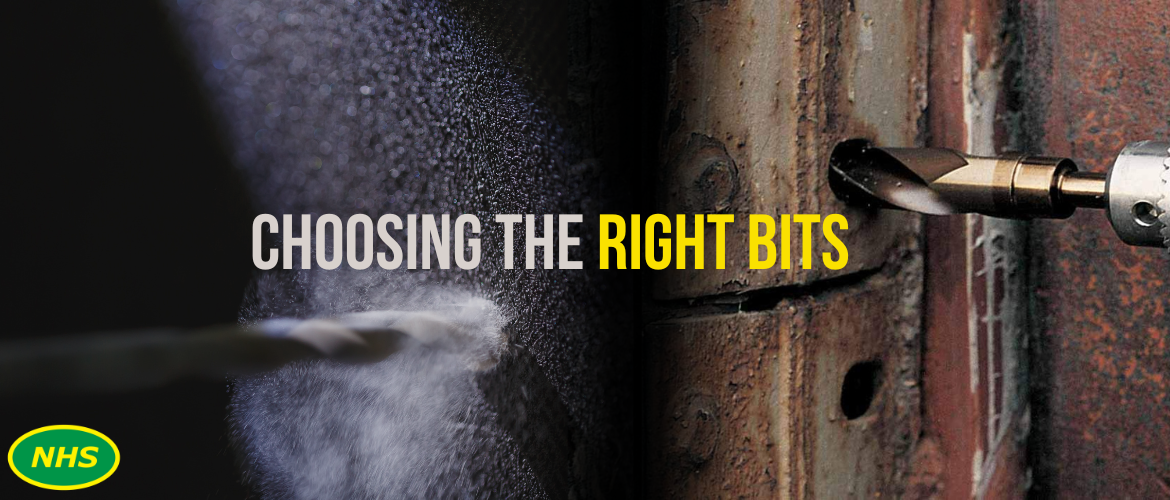The Right Bits Go A Long Way
We treat bits like another disposable accessory in our toolbox. They’re easy to come by so when they break they don’t really make an impact on the job.
In this article, we will dive into the reasons to invest in a good drill bit and select the right bit for every job.
Why Invest In A Good Bit

- Longevity & Toughness: One of the most important features of a quality drill bit is its ability to withstand demanding usage over time. A well-crafted drill bit allows you to concentrate on the task at hand without worrying about equipment failure. This not only makes it more sustainable but also a cost-effective choice in the long run. While these drill bits may have a slightly higher upfront cost, they will ultimately save you money on replacements in the future.
- Improved Functionality & Speed: A high-quality drill bit usually has better technology and upgraded designs, leading to better performance. These features might involve special points for faster cutting and reduced wandering, materials that make the bit last longer, or coatings that decrease heat and enhance lubrication. Using good bits result in neat, precise holes without rough edges, giving you a more refined final product.
- Precision & Accuracy: Quality drill bits are engineered with precision in mind because what matters more than maintaining the structural integrity of the structures you’re working with? This is particularly important for jobs that require accuracy like woodworking and metalworking. The engineering that goes into quality bits will reduce the chances of errors and help ensure that each hole is drilled perfectly.
- Versatility: Good drill bits are available in various types and sizes, and they can handle a wide range of materials and projects. Because they're made with high-quality materials, they perform well on different materials such as wood, metal, plastic, aluminum, or both light and heavy steel. The specific application, material thickness, and advice on the packaging will determine their effectiveness.
Choosing The Right Bit

Timber Drilling
When working with timber, it's crucial to choose the appropriate drill bit to achieve clean and precise holes. For general timber drilling, we recommend any of the following: Sutton’s High Speed Steel Drill Bits the Alpha Onsite Plus range. Additionally, the Alpha Turbo Spade Bits and the Sutton Auger Bits are specifically designed just for timber drilling and will work exceptionally well.
Mild Steel/Aluminium Drilling
When dealing with mild steel and structural steel, you need resilient drill bits that can handle the pressure Sutton’s High Speed Steel Drill Bits, along with the Alpha Onsite Plus range., are all well-suited for these materials.
However, no matter the power and capability of these drill bits, it’s important that a generous amount of lubrication is used and continuously reapplied throughout.
Stainless Steel Drilling
Stainless steel is a tough material and drilling through it requires even tougher tools. For such jobs, make sure to choose either our reliable Alpha cobalt Steel Drill Bits or the Alpha Stainless Plus Drill Bits, specially formulated for the ultimate drilling experience in...yes, you guessed it right, stainless steel.
And, of course, always remember to apply Cutting fluids to keep the drill bit cool and prevent work hardening. This becomes particularly crucial when working with stainless steel, as you may need to reapply the lubricant multiple times during the drilling process to ensure optimal performance.
Specialty and Masonry Drilling
Specialised drill bits are essential for jobs such as drilling through glass, tile, or bricks, particularly when these kinds of materials are not cheap. Since mistakes can be costly, using the right specialty drill bits ensures the job is done correctly on the first try. Alpha’s Diamond Max Core Drill Hex Shanks are ideal for cutting through speciality materials. This bit is ideal for wet or dry drilling through porcelain, ceramic, granite, marble, limestone, slate, terracotta, fibreglass, travertine, and masonry.
Concrete Drilling
Concrete is a common material in construction projects, and proper drill bits are essential for the job especially when it involves any type of reinforcement.



